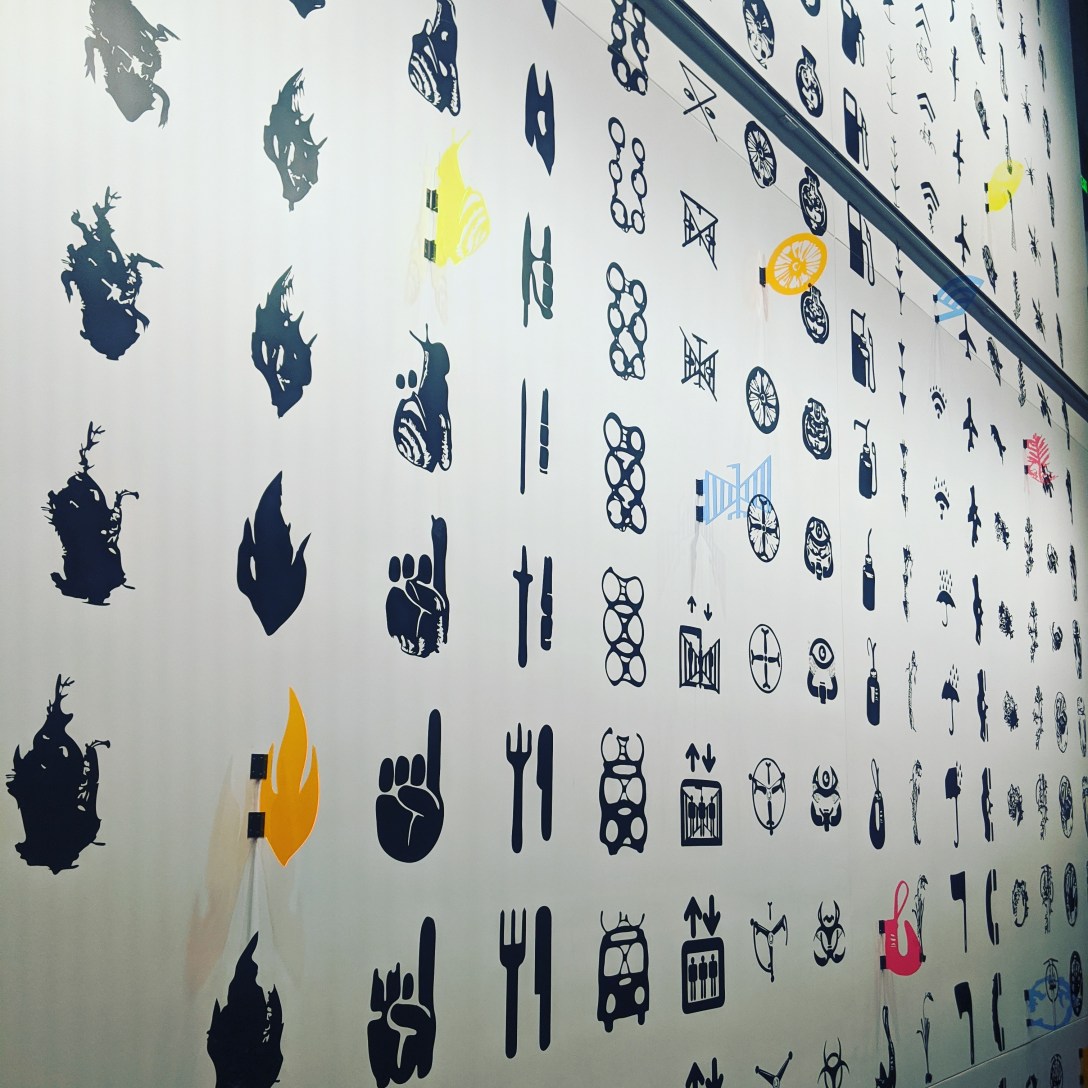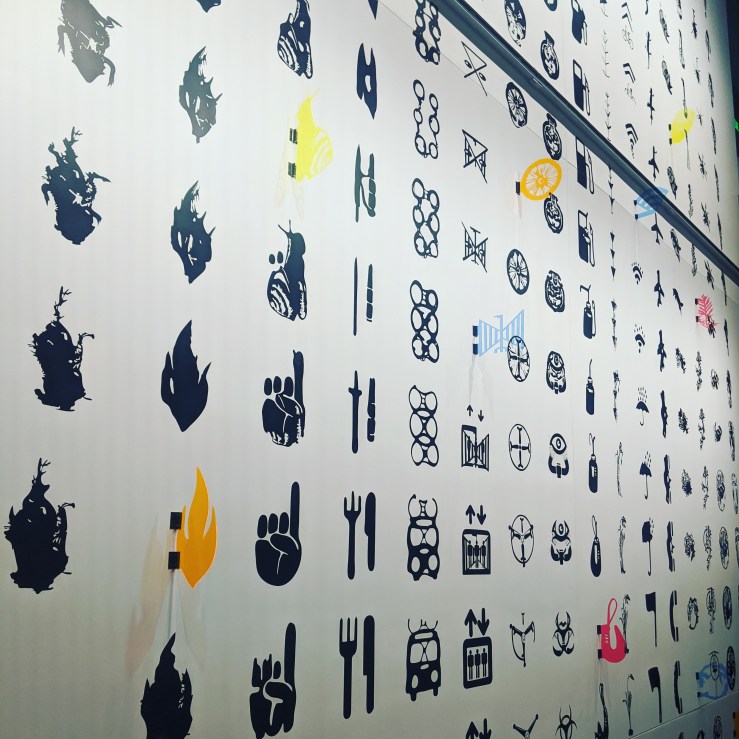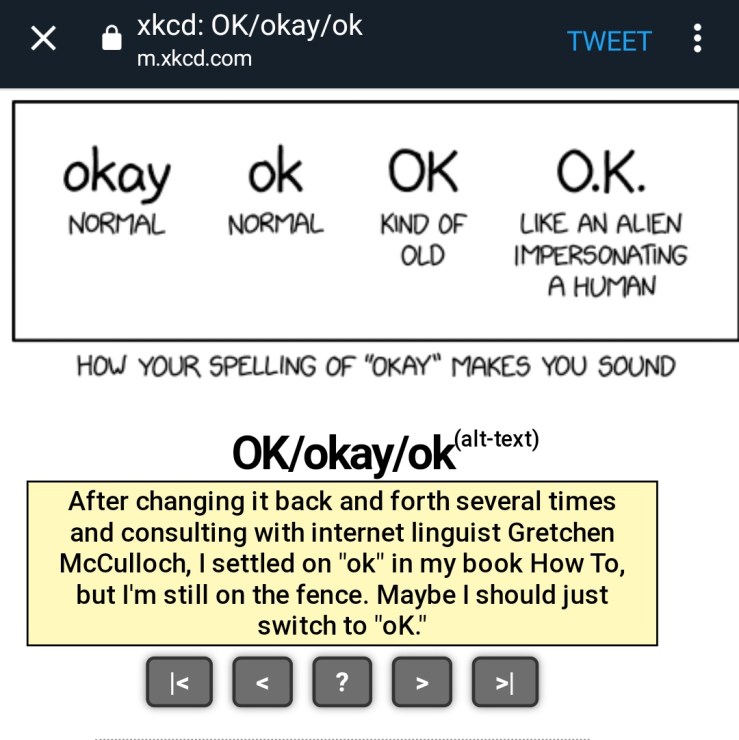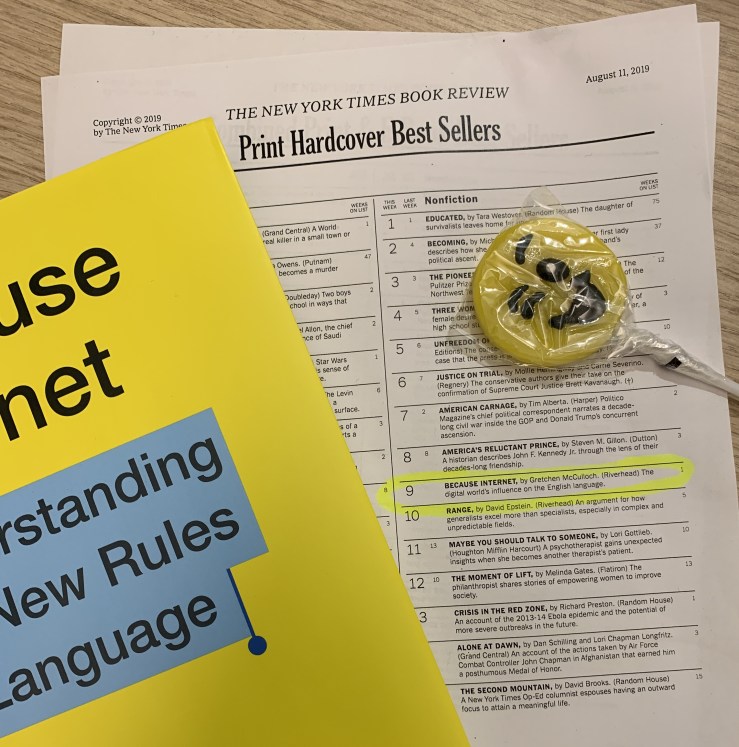Because Internet, my book about internet language, is now available in paperback! Links to get it in all of the formats, including how to get signed copies.
Here are some photos of the new paperback edition, same bright yellow cover, now with 10x more nice quotes from people. I also wrote an old-school reflexive blog post about what it’s like to hit the final milestone in a book journey that began in 2014. Because Internet was also featured in Paperback Row, the New York Times’s list of paperback books that came out this week, among other media (below). (There was also, briefly, one of those ebook sales.)
My Wired article about preliterate children texting in emoji from a while back was translated for Wired Japan. Here it is in Japanese and here it is in English again.
Lauren Gawne and I gave a talk for Abralin, the Brazilian Linguistics Association, about emoji and gesture. You can watch it online here on the Abralin youtube channel. (Auto-captions only; for similar content already in text form see our slides, this livetweet thread, our paper about emoji as gesture or the transcript of our Lingthusiasm episode about emoji and gesture in Because Internet.)
The main episode of Lingthusiasm was about phatic expressions like “hey”, “no problem” and “bye” and the bonus was about linguistics and music, including tones, drums, and whistled languages.
If you’re a Lingthusiasm fan, and you’re considering reading the Because Internet audiobook but you wish Lauren was there too, not just my voice all by itself, we now have a solution to that problem! That’s right, we’ve made a clip of Lauren-backchannelling audio that you can now play on loop in the other ear while you listen to the Because Internet audiobook.
Lauren and I also finally finished the bulk of the writing on the scripts for Crash Course Linguistics this month! We’ve been working on this intensively since March, not to mention the planning side in previous months. The Crash Course and Thought Cafe teams are now moving into exciting things that we’re less involved in, like filming and animating, although we’ll still be keeping an eye on technical accuracy as it goes along. I’m excited to share that the 16 ten-minute intro linguistics videos will be going up on the Crash Course youtube channel starting in September! If you want to get emails with each of the Crash Course Linguistics videos and suggested further reading/activities as they go up, you can sign up for the Mutual Intelligibility newsletter.
I did an edition of Mutual Intelligibility about teaching internet linguistics in honour of Because Internet coming out in paperback, along with several other great resources in the internet linguistics domain.
Media list:
- Rotten Tomatoes – mention “WHY AIRPLANE!’S TITLE IS ONE OF THE CLASSIC COMEDY’S BEST JOKES” – 7/2
- The New York Times – interview “A Short History of ‘Simp’” – 7/7
- Grist – mention “Is nature all healed now? A look at the pandemic’s best meme” – 7/9
- Daily Beast – mention – 7/17
- Inverse – mention “Comic-con@Home” – 7/29
- Against The Grain – Book of the Week – 7/31
- New York Times – paperback row – 8/2
Radio/Podcast:
- Lifehacker’s The Upgrade podcast – interview – 7/23
- Something You Should Know Podcast – interview – 7/23
- The Pulse/ WHHY – interview – 7/24
Selected tweets:
- Structural ambiguity: Never gonna give you UP
- it has come to my attention that the Chinese translation of Häagen-Dazs ALSO has a spurious umlaut on it
- scanning your phone, I don’t even
- Thinking about how we can establish better virtual “hallways” as conferences and so on move online (thread)
- the word “cakeroll”
- why the international phonetic alphabet is useful: “genre” in various languages
- apparently we’re dreaming in videochat now
- New favourite example of scalar implicature: many whales were never taught how to drive stick shift
- Roaring twenties / tossing pennies – a short thread about post-nasal stop deletion
- Asterisk correction in chat (thread starting with an xkcd comic)
- I began an experiment trying to replicate the “hallway circuit” online
- The emotional valence of periods in text messages
Selected blog posts:
- “Language features are not neutral in the way that the calculator feature is neutral.”
- Linguistics jobs: freelance writer (and creator of Dinosaur Comics)
- Pompeiian graffiti
- A video singing the names of the Indigenous languages of Australia
- A final blog post about Because Internet
- When the official tumblr books blog approves of your book, you know you’ve done something right
- Writing in ways that communicate our tone of voice
- The poetic process powering real-time language translation in Namibia
- An online linguistics class for high school students in fall 2020
This month’s image is, of course, that snazzy paperback edition of Because Internet! The inside is pretty much the same, except that there are now two entire pages of fancy people saying nice things at the front, which you can see here, should you desire. But it’s also just been really gratifying over the past year to hear from so many regular internet people on social media finding yourselves in its pages. Thank you.




















You must be logged in to post a comment.